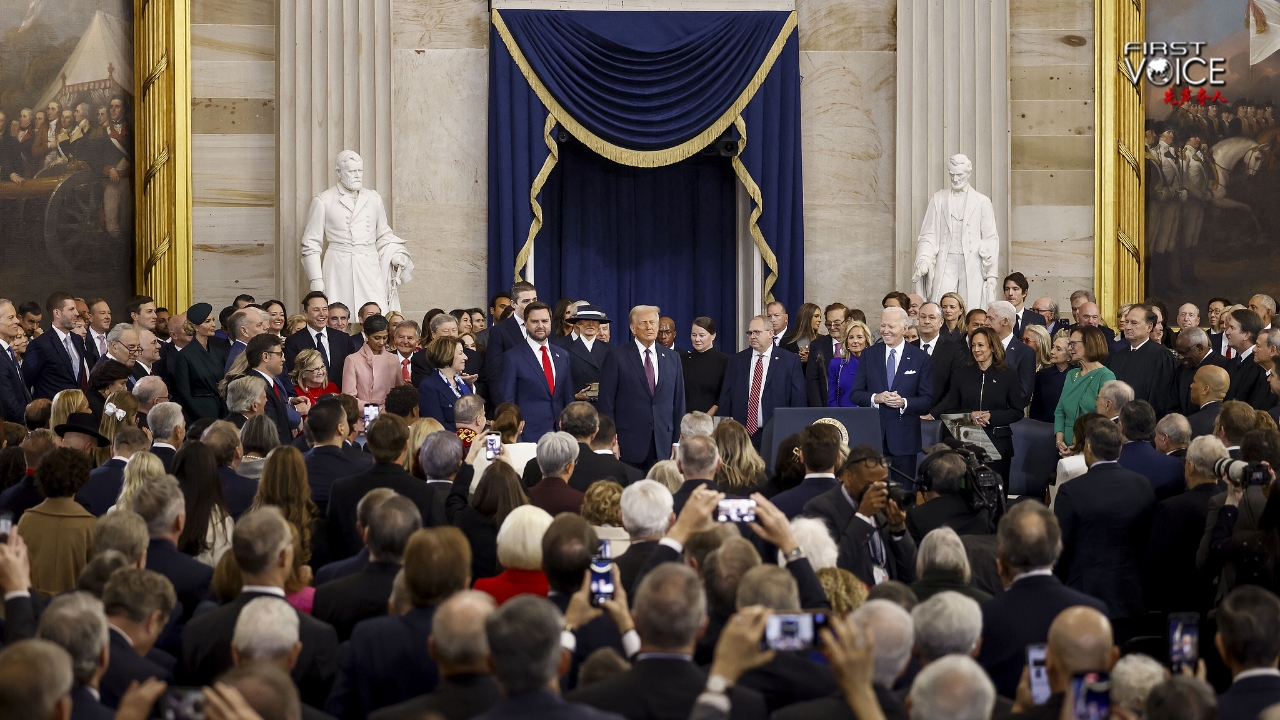
Editor's note: CGTN's First Voice provides instant commentary on breaking stories. The column clarifies emerging issues and better defines the news agenda, offering a Chinese perspective on the latest global events.
By Huang Jiyuan
It was nothing ordinary. For four decades, U.S. presidents took their oath of office on the Capitol steps. For more than 130 years, no U.S. president has won the White House after losing reelection. For most people today, U.S. presidents have used free trade, international cooperation and the liberal order as political platitudes.
Then, here we are, the 45th President of the United States, Donald Trump has been sworn in as the 47th President of the United States inside the Capitol Rotunda, with the mercantilist, nationalistic and "America First" ideology unified and solidified behind him after many have described as a solid election victory.
Brace for impact.
It's hard to deny that the Trump 47th's inaugural address sounds "more normal" than Trump 45th's. There was no "American carnage," but a promise of the new "Golden Age." The undertone, however, remains clear. It's about a new age of American expansionism – renaming the Gulf of Mexico to the Gulf of America and taking back the Panama Canal (and maybe purchasing Greenland and annexing Canada, if that rhetoric is to be believed); It's about America raking it in with "Instead of taxing our citizens to enrich other countries, we will tariff and tax foreign countries to enrich our citizens"; It's about enhancing America's industrial capabilities - using the "liquid gold under our feet," ending the Green New Deal and revoking the electric vehicle mandate for the auto workers who Trump "did tremendously with their vote"; It's about America being "free, sovereign and independent."
And seemingly to prove his point, as this article is being written, a news alert popped up on the phone showing that Trump had signed an executive order to begin pulling the United States out of the Paris Agreement, which he believes unfairly burdens Americans. He has also withdrawn the U.S. out of the World Health Organization.
Whether this will usher in a new "Golden Age" remains to be seen. The 19th-century sentiment didn't particularly land the world in a good place back then. At a time when empire building was both at its height and beginning to wane as empires or empire-wanna-bes competed with each other for land and resources overseas, nationalism, mercantilism and populism eventually dragged the world into chaos in the first half of the 20th century. The U.S. was no mere spectator. The isolationist streak in the country was so powerful that when President Woodrow Wilson proposed the League of Nations to establish an international conflict-resolution mechanism in response to the First World War, Congress rejected it.
One can't help but wonder whether that's the role Trump envisions the United States playing – an economic and territorial empire that covers most of North America, extends into the Arctic and Europe, with piles of cash reaped from other countries, standing alone outside the international system has facilitated a great leap in human development over the past decades, caring only about itself and no one else.
That would be an unfortunate misjudgment of the world today and a costly failure to learn lessons for the last four years he spent in the White House. He wanted a trade surplus with China by imposing tariffs on Chinese imports, but it failed. The United States has risen to become the second-largest importer of Chinese goods, surpassing the European Union. He wanted a ban on TikTok before, only to issue an executive order on his inauguration day halting the ban for 75 days. And America's failure to embrace its international responsibility resulted in a double-digit drop in the positivity in the global community's view toward it.
And the United States has enough problems to deal with. Politics remain divided. According to Gallup, Republicans' and Democrats' ideologies were their most extreme in 30 years in 2024. The American people's trust in government institutions is at historic lows. Top issues like immigration and drugs are complicated domestically and internationally. And they can't be solved by antagonizing the international community with bravado or outlandish claims that belong more in shouting matches on the streets than in high-stakes negotiations in international politics.
But then, again, the world has made many of these arguments during the last four years of the Trump White House. They seem to have dented little of the nationalistic, mercantilist, populist and isolationist fervor.
So, brace for impact.
The author Huang Jiyuan is an Opinion Editor at CGTN.

 中文
中文



